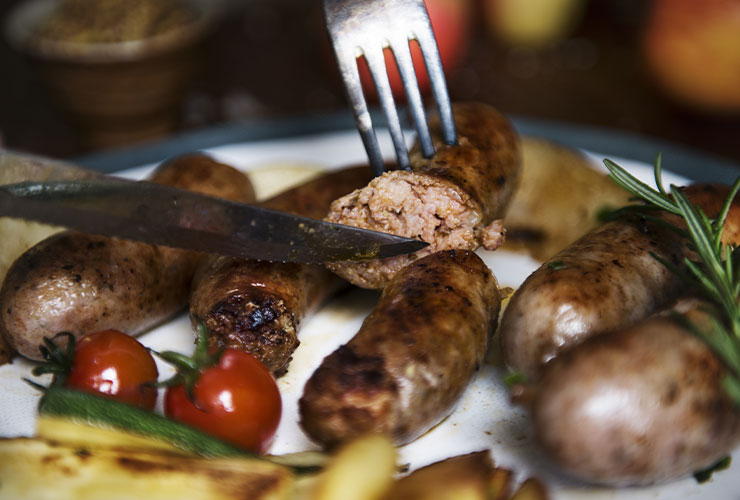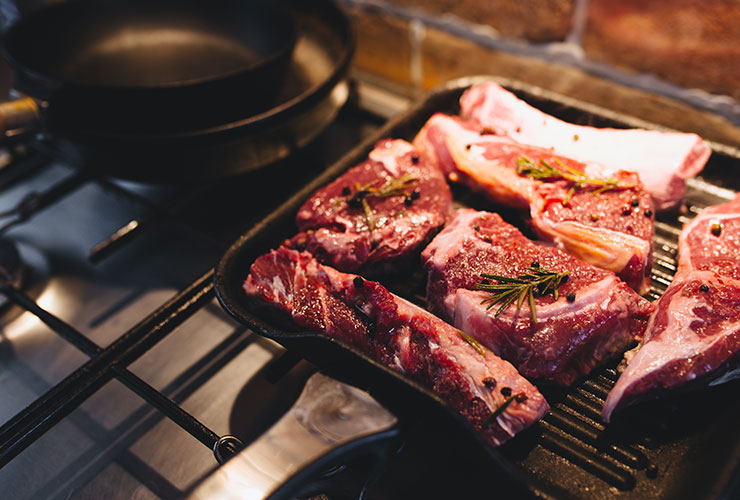Pizza, pasta, espresso… how do you say one of these things is delicious in Italian? No matter if you say it in your home country or during a trip in Italy in a restaurant. As you probably know, there are several ways to tell someone in Italian that something you usually eat with pleasure or taste is delicious.
HOW DO YOU SAY DELICIOUS IN ITALIAN?
The literal translation for delicious in Italian is delizioso. It can be used not only to talk about delicious food, but also referred to nice people who inspire tenderness and / or appreciation. Other ways to say delicious in Italian are buono (good/tasty), squisito (exquisite), gustoso (tasty), saporito (flavourful /flavorsome), appetitoso (appetizing ) and many more. Also, you can say delicious in Italian with common idioms such as da leccarsi i baffi or far venire l’acquolina in bocca!
Well, what we are going to portray in this article is how to talk about good food focusing on the different ways of saying delicious in Italian.
Hence, let’s start with some practical examples; after that, we’ll see in detail each case.
Examples:
Allora, ti è piaciuto il pranzo di oggi? Tutto delizioso, grazie!
So, did you enjoy lunch today? Everything was delicious, thanks!
Hai sentito di quel posto dove fanno hamburger spettacolari? Ci andiamo?
Have you heard about that place where they prepare spectacular burgers? Shall we go?
Now, let’s see everyday expressions and idioms used to talk about good food:
1. Buono

The very first expression you could use to indicate that something is delicious in Italian is buono. Its meaning can vary according to the context, but it mainly translates as good or tasty when it refers to food.
Examples:
La torta alle ciliegie di mia madre è sempre buona.
My mother’s cherry pie is always good.
Dove hai comprato questi muffin? Sono davvero buoni!
Where have you bought these muffins? They’re really tasty!
In case you want to state that something is extremely tasty, you can also employ buonissimo, the absolute superlative of good.
Examples:
Prendi quei biscotti al cioccolato. Sono buonissimi!
Take those chocolate cookies. They’re very good!
Che ne pensi della mia crostata di prugne? – Buonissima!
What do you think about my plum tart? – Very good!
Also, check out these useful books if you want to learn more Italian words and expressions related to food:
2. Delizioso
Secondly, we have delizioso which sounds very similar to the English term delicious. Besides food, this statement is also employed in the meaning of charming, adorable when describing someone’s personality.
Examples:
Com’è questa cassata? – È deliziosa!
How does this cassata taste? – It’s delicious!
La madre di Gianni è davvero una signora deliziosa.
Gianni’s mother is such an adorable lady.
Fun fact: In a famous scene of the animated feature film “The Aristocats”, mother cat Duchess and her three kittens are drinking milk with their friend, Roquefort the mouse, from a bowl served by the evil butler, Edgar; in the Italian version, the three kittens keep on saying their meal is delicious using terms like delizioso, doppiamente delizioso and squisito.
3. Squisito
In the third place, another term to refer to something delicious in Italian is squisito. This one stands for excellent or exquisite and is usually employed to highlight the tastiness of a well-cooked meal.
Also, in this case, you are allowed to use it when talking about refined and friendly people.
Examples:
Credo che questo risotto ai funghi sia squisito.
I think this mushroom risotto is exquisite.
Tutti pensano sia una persona squisita ma io non sono d’accordo.
Everyone believes that he’s a refined man but I disagree about that.
4. Gustoso

In case you are enjoying a great Italian meal that tastes good to you, you can say it is gustoso. Furthermore, this expression may be rendered as full of flavor, too.
Examples:
La zuppa che hai preparato l’altro ieri era proprio gustosa.
The soup you made the day before yesterday was really tasty.
Che ne dici di questi panini al formaggio? – Molto gustosi!
What do you think about these cheese sandwiches? – Very tasty!
5. Saporito
Since they have the same meaning, gustoso and saporito can be considered synonyms. However, you better use saporito to state that your favorite food is delicious in Italian when you want to focus more on its flavor. The equivalent translation in English might be flavourful or flavorsome.
Examples:
Che piatto saporito! Consigliatissimo!
What a flavorsome dish! Highly recommended!
Non avrei mai pensato di mangiare una carbonara così saporita!
I never thought to eat such a flavourful carbonara!
Here there are other books about food you can read in order to improve your skills:
6. Ottimo
Going on, we have to mention ottimo whose meaning can vary according to the context where it is applied. Generally, when speaking about food, ottimo translates as really good and excellent. Although it is not as forceful as squisito, it still conveys more involvement than just buono.
Examples:
Jamie, ti piace questo gelato alla frutta? – È ottimo!
Jamie, do you like this fruit ice cream? – It tastes really good.
Le ostriche erano ottime mentre le cozze troppo salate.
Oysters were excellent while mussels were too salty.
7. Eccellente
Another statement to say what you are eating is delicious in Italian is eccellente. Even though it is not much used to describe food, you can easily resort to it as a valid option.
Examples:
Mi hanno detto che i dolci di quella pasticceria sono eccellenti.
They told me the desserts of that pastry shop are excellent.
Mi dispiace deluderti ma la tua cheesecake non era eccellente.
I have to disappoint you, but your cheesecake wasn’t so excellent.
8. Spettacolare

Similarly, you can bump into spettacolare, an over-the-top statement employed when speaking about good food to make someone proud of his homemade meals.
Examples:
Devi assaggiare la pizza con provola e salsiccia. È spettacolare!
You must try the pizza with provola and sausages. It’s spectacular!
Comunque, la torta per il diciottesimo di tua sorella è spettacolare.
Anyway, the cake for your sister’s 18th birthday party is spectacular.
As you can see, in the second example spettacolare can be also applied to display something aesthetically.
9. Appetitoso
Now it’s time to introduce appetitoso, a word that has great relevance when talking about something delicious in Italian. This term is strictly linked to the concept of appetite, more precisely to the idea of foods stimulating hunger.
Examples:
La tua parmigiana non sembra affatto appetitosa!
Your parmigiana doesn’t seem to be appealing at all.
Gli spiedini di agnello hanno un aspetto appetitoso.
Lamb skewers look appetizing.
As you may have noticed, in the first example appetitoso has been used to define the outward appearance of a product. On the contrary, the second example, directly refers to the quality features of the dish in question.
10. Succulento

Equally important is the expression succulento, less used than the other statements but still present in some particular circumstances. Despite that, the term is chiefly employed in formal contexts to describe meat.
In addition, when applying it, you want to convey the idea of something tempting or overwhelming you can’t do without.
Examples:
Oggi lo chef propone una succulenta bistecca ai ferri.
Today the chef suggests a succulent grilled steak.
Mi ha regalato un cestino di more e lamponi succulenti.
He gave me a basket of juicy blackberries and raspberries.
11. Invitante / Allettante
Correspondingly, invitante and allettante are used to point out something delicious in Italian. Standing for tempting or moreish, both apply to food and other areas of interest such as prices, people, or business.
Examples:
Quel cosciotto di pollo è proprio invitante. Posso prenderlo?
That chicken leg is moreish. May I have it?
La tua proposta è allettante ma non me la sento, mi dispiace!
Your proposal is tempting but I don’t feel like it, sorry!
12. Stupendo
Finally, we can find stupendo. Even if it has been included in the list of the most common statements to express what is delicious in Italian, its use is widely restricted to informal situations when referring to food anyway. Despite that, it remains a valid alternative to other more common words.
Examples:
Hai dato il meglio di te l’altra sera. Hai cucinato una pasta stupenda!
You’ve outdone yourself last night. You cooked stupendous pasta!
Quando ero piccolo, mia nonna preparava sempre torte stupende.
When I was young, my grandmother always used to bake stupendous cakes.
The last thing to remember is that all these expressions we have seen until now are adjectives; this means that they must agree in gender and number with the thing they are referring to.
Common Idioms to Say Delicious in Italian

Now I’m going to show you some of the most common idioms Italians usually employ to tell someone they are enjoying their favorite food.
13. Da leccarsi i baffi
First of all, we have to mention da leccarsi i baffi (literally to lick one’s mustache). This idiom originated from the animal world; specifically, it refers to the image of a hungry cat licking its whiskers while waiting anxiously for its meal. For this reason, it has entered the common language with the current meaning of mouthwatering.
Examples:
Guarda qua! Questa qui è roba da leccarsi i baffi!
Look at this! All this stuff here is mouthwatering!
È buona questa cotoletta alla milanese, vero? – Da leccarsi i baffi!
This Milanese breaded cutlet is tasty, isn’t it? – Mouthwatering!
14. Far venire l’acquolina in bocca
Instead, far venire l’acquolina in bocca is the best way to say that something is particularly delicious in Italian. It occurs very frequently in daily conversations among Italians and means to make someone’s mouth water. If you use it at the right time, you’ll sound like a true native Italian speaker!
Examples:
Quelle praline al cocco mi fanno venire l’acquolina in bocca.
Those coconut pralines make my mouth water.
La pasta con pomodoro e basilico gli fa venire l’acquolina in bocca.
Pasta with tomatoes and basil makes his mouth water.
Note that you must apply indirect object pronouns and conjugate the verb fare properly when using this idiom.
15. Uno tira l’altro

This last expression is useful in case you started eating something delicious (e.g. chocolates) and just can’t stop. Therefore, you’ll say “uno tira l’altro”, which stands for one pulls the other, about what you are tasting. For an effective translation, you are suggested to employ moreish or addictive.
Examples:
Tutti sanno che ad un matrimonio un confetto tira l’altro!
Everybody knows that sugared almonds are moreish at a wedding!
Hai presente le caramelle mou? Una tira l’altra!
Do you know taffies? They’re so addictive!
Remember that indefinite pronouns uno and altro must always agree in gender and number with the thing they refer to.
Conclusion
Coming to the end of this article, you should be able to use all the possible statements to tell someone your favorite food is delicious in Italian. Of course, it is not necessary to remember all of them by heart. Alternatively, you could watch movies, cooking shows, or perhaps listen to songs since they are often full of food-related definitions.
Now that you know how to say delicious in Italian, tell your Italian friend if what you’re eating is buono or succulento.



